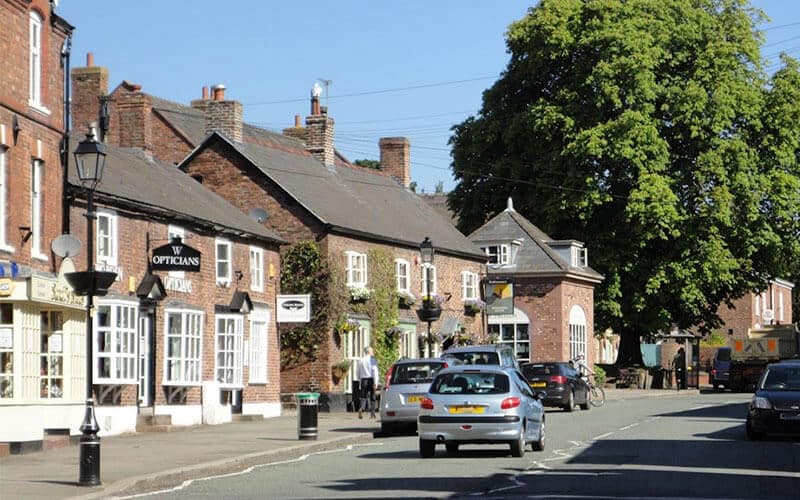

The main advantage of a zero-deposit mortgage is the ability to purchase a property without having to save up for a deposit (which is usually 10-20% of the property’s purchase price). This opens up doors for many individuals and families who may have found it challenging to accumulate a substantial amount of money required for a deposit.
Zero deposit mortgages are currently only provided by the lender Skipton, called Skipton’s Track Record Mortgage. There used to be more offerings before the 2008 financial crisis, but since then we haven’t had a real zero-deposit deposit mortgage offering – until now. There are other similar mortgages such as the Barclays Springboard mortgage or the Lloyds ‘Lend a Hand’ mortgage however, these are not true 100% mortgages as they do require family assistance in providing a lump sum.
Whilst a zero-deposit mortgage offers an exciting opportunity, it’s essential to understand the eligibility criteria. To qualify for a no-deposit mortgage, amongst the usual criteria set out by lenders such as your credit history, income stability, and employment, there are more, which we discuss here (hyperlink to anchor text will be here). By familiarising yourself with these criteria, you can assess your chances of approval and take steps to improve your eligibility if needed.
Arguably the main advantage of zero-deposit mortgages is that you can purchase a property without the initial deposit that is usually asked for with other mortgage options. This is a breakthrough product for individuals and families that don’t have the means to save up for a deposit on a property. By purchasing a property with a 100% mortgage you could be on the housing ladder quicker than was originally thought possible.
Not having to save for a deposit allows you to enter the property market sooner, giving you a head start on building equity in your own home. Instead of spending years trying to save up a large sum of money for a deposit, you can get a 100% mortgage and then spend that time (and money you would otherwise be paying in rent) building up your investment. This is particularly beneficial in areas where property prices are rising rapidly, as you can benefit from the potential increase in value without waiting to save up a deposit.
With a 100% mortgage, you’ll have the benefit of using already saved-up deposit funds for other various essential expenses. Whether it’s investing in immediate home improvements, covering moving-in costs, or settling agent and solicitor fees, this option empowers buyers to make their new house feel like home from the start.
Another advantage of zero-deposit mortgages is the flexibility they offer. When buying a home you would, with a typical mortgage, need to save up a deposit of 10% to 20% of the property’s value, E.g. for a property costing £270,000 a 20% deposit would be £54,000. By removing the need for a deposit, it makes getting on the property ladder much more accessible.
While zero-deposit mortgages might seem enticing with the prospect of no initial deposit and lower monthly payments, they do come with certain risks and considerations. Here are some of the key risks associated with zero-deposit mortgages:
Some zero-deposit mortgage offers might only last for an introductory period, typically a few years. After this period ends, the interest rate can increase significantly, leading to higher monthly payments.
Currently the only lender offering a zero-deposit mortgage is Skipton. As a result, there will be limited options and you may potentially miss out on better deals with more traditional mortgages.
Lenders may impose stricter eligibility requirements for zero-deposit mortgages, making it harder for some borrowers to qualify.
With a 0% down payment, you won’t have any equity in your property initially. If the property value decreases, you could find yourself in a negative equity situation, owing more than the property’s current worth.
Some zero-deposit mortgages may be restricted to specific properties or developments, limiting your choices.
It’s essential to thoroughly read and understand the terms and conditions of any mortgage offer, including 0% mortgages, before committing to such an arrangement.
Lower LTV (loan to value) products may have better interest rates, so putting a deposit down may enable you to get a cheaper rate and thus a cheaper monthly payment.
Also, with a zero-deposit mortgage with Skipton, you will be capped by your current rental amount, meaning your mortgage repayments can’t exceed your current rent which means the total value of the property you would like to purchase will be limited. With a traditional mortgage, you may be able to afford more, especially if it is a 2-person joint application, as you’ll have a larger budget to work with.
When it comes to zero-deposit mortgages, there is only 1 true 100% mortgage (This is from Skipton). However, there are a few similar options available to suit different needs. Understanding the different types of mortgage options available will help you determine which one is the right one for you.
One type of mortgage close to the zero-deposit mortgage is the guarantor mortgage. With this option, a family member or close friend acts as a guarantor, this will provide additional security to the lender. This is a great choice if you have a reliable guarantor who is willing to support your application.
Here are 3 other main contenders to the zero deposit mortgages:
Barclays offers a unique mortgage product known as the “Family Springboard” mortgage, This mortgage presents an innovative way for aspiring homeowners to step onto the property ladder without the need of a traditional deposit. This mortgage option provides a lifeline to individuals who struggle to save up for the property deposit. Instead, they can rely on the support of a “helper,”. This is usually a family member or close friend, who contributes the equivalent of 10% of the property’s purchase price into a dedicated linked savings account.
With Halifax’s “Family Boost” mortgage, eligible homebuyers can access a higher loan-to-value (LTV) ratio by having a family member deposit a specific amount into a linked savings account. The family member’s savings act as security, reducing the risk for the bank and enabling the homebuyer to access more favourable mortgage rates and terms. The savings account remains untouched throughout the mortgage term, and once the borrower reaches a certain level of equity, the family member’s money is returned.
On the other hand, Lloyds’ “Lend a Hand” mortgage operates on a slightly different principle. Instead of using a linked savings account, this mortgage involves a family member contributing a cash sum equivalent to a specified percentage of the property’s purchase price. The bank retains this cash as security while offering the homebuyer a 100% LTV mortgage. Similar to Halifax’s approach, the family member’s money is returned once the borrower builds sufficient equity in the property.
It’s important to carefully consider your financial situation and long-term goals when choosing a mortgage. Each type of mortgage has its own advantages and considerations. For example, while a guarantor mortgage may offer flexibility, it also requires a guarantor who is willing and able to support your application. Whilst a 100% mortgage is a good option if you’re looking for an affordable way to enter the property market.
By exploring the different types of mortgages, you can find the option that best aligns with your needs and circumstances. Whether you choose a guarantor mortgage, shared ownership, or a government-backed scheme, a zero-deposit mortgage can provide the opportunity to get on the property ladder without having to save for a deposit.
What do you need to qualify for a no-deposit mortgage?
The only mortgage provider providing a zero-deposit mortgage is currently Skipton, here are some criteria you are likely to encounter during your search for a 100% mortgage:
One of the eligibility criteria for the Skipton zero deposit mortgages is that the borrower needs to be 21 years old or over. This age requirement ensures that borrowers are financially mature and have a stable income to handle the responsibilities of homeownership.
The Zero deposit mortgage is often limited to first-time homebuyers. If you have previously purchased a property or currently own one, you will not qualify for this type of mortgage. This mortgage is aimed at assisting individuals who are trying to step onto the property ladder for the first time.
To demonstrate financial responsibility and creditworthiness, borrowers need to provide rental history for the past 18 months. Specifically, they should have proof that rent payments have been paid on time and in full for at least 12 consecutive months during that period. This requirement ensures that applicants have a track record of meeting their financial obligations.
In addition to rental history, lenders may also request evidence that the borrower has paid all household bills promptly and in full for at least 12 consecutive months out of the past 18. This includes bills such as council tax, electricity, and gas. This criterion further reinforces the applicant’s ability to manage ongoing financial commitments.
Skipton will assess the applicant’s credit history to determine their overall financial responsibility. Any missed repayment commitments within the past six months, including payments for services like Netflix subscriptions, mobile phone bills, or internet providers, may negatively impact their credit report and eligibility for a zero deposit mortgage.
Zero deposit mortgages are generally not available for purchasing new build properties. This limitation is because new builds often come with higher purchase prices, and lenders prefer to mitigate risk by requiring borrowers to have some equity in the property upfront.
It’s essential to understand that Skipton will also consider the applicant’s credit score and overall financial situation to assess their affordability for the mortgage. A strong credit score and a stable income are essential factors that can increase the likelihood of approval. Skipton notes that “Each applicant must have no missed payments on debts or credit commitments over the last 6 months, as a minimum”
Unfortunately for those dreaming of significantly improving the value of the home they live in, Skipton are only able to borrow less than or equal to the amount they are currently paying in rent each month.
For example, if you are currently paying £850 in rent each month, you can only get a property that results in a mortgage with a monthly payment of £850 or less. With Skipton’s affordability calculator indicating that a renter paying this amount would be able to buy a property with a maximum value of £158,475 – potentially pricing some buyers out of the market altogether in certain areas of the country. As with all lender criteria, this may be subject to change in the future.
Lenders prefer applicants who have a stable job and a consistent income. If you’re in temporary employment or have recently changed jobs, lenders may require additional evidence of your employment history and income.
In addition to these factors, other aspects of your financial situation will also be looked into such as your existing debts and monthly expenses. They want to ensure that you have sufficient income after other outgoings to comfortably afford the mortgage repayments. It’s important to be honest and transparent about your financial situation when applying for a zero-deposit mortgage.
Applying for a zero-deposit mortgage can be an exciting step towards homeownership without the need to save for a deposit.
Lenders will assess your credit history when considering your application. It’s essential to review your credit score and address any issues before applying for any mortgage. Pay off any outstanding debts and ensure that you are on the electoral roll to improve your creditworthiness.
Whilst a zero-deposit mortgage eliminates the need for a deposit, there are still other costs associated with buying a property, such as legal fees and stamp duty. It’s important to save for these additional expenses to demonstrate your financial responsibility and ability to cover these costs.
Lenders will require various documents to assess your eligibility. Gather all the necessary paperwork in advance to speed up the application process and show lenders that you are well-prepared.
Applying for a mortgage can be a complex process, especially when it comes to zero-deposit mortgages. Seek advice from a mortgage broker (such as Green Mortgages) as we can provide valuable insights and advice tailored to your specific circumstances.
It’s important to have a clear understanding of your finances and what’s within your budget before applying for a no-deposit mortgage. Consider your monthly income, expenses, and potential future changes, such as interest rate fluctuations. You will need to demonstrate to lenders that you are financially responsible.
In conclusion, zero-deposit mortgages offer a lifeline to aspiring homeowners who are struggling to save up for a deposit. By eliminating the need for a hefty deposit, these innovative financial products open up doors for many individuals and families who may have found it challenging to accumulate a substantial amount of money.
The benefits of zero-deposit mortgages are clear – they allow you to enter the property market sooner, Exploring The different types of zero-deposit mortgages to help you find the option that best aligns with your needs and circumstances.
Don’t hesitate to contact Green Mortgages today and secure your complimentary consultation. Our discussion will revolve around your mortgage needs, with a special emphasis on exploring 100% mortgage options if required. Let’s work together to find the perfect mortgage deal that suits your needs.



